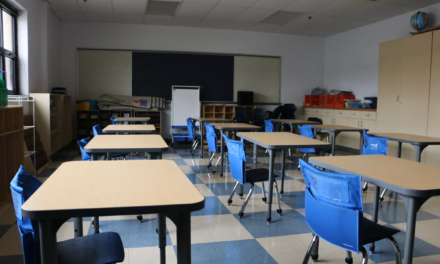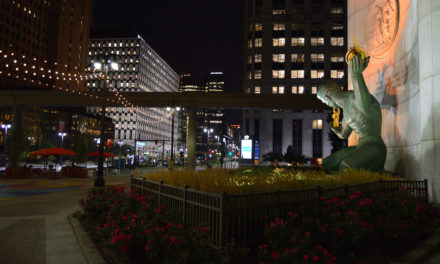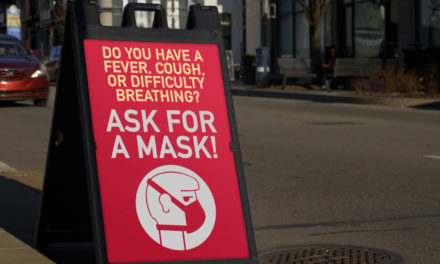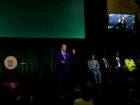As Michigan’s business, government, and civic leaders continue to work remotely under Gov. Whitmer’s “Stay Home, Stay Safe” order, many are missing the tradition of the annual Detroit Regional Chamber Mackinac Policy Conference at Grand Hotel on Mackinac Island. For the past 39 years, statewide leaders have spent three days each spring discussing Michigan’s critical issues, and in many cases, putting solutions into motion.
For individuals used to attending or tuning in to the Conference the week of Memorial Day, the Chamber and Detroit Public Television will spend Tuesday, May 26 through Thursday, May 28 sharing some of the most memorable #MPCMoments.
One Detroit’s Christy McDonald talks with Detroit Regional Chamber President & CEO, Sandy Baruah, about the kinds of conversations audiences can look forward to and what MPC might look like in the future.
Read the full transcript
Christy McDonald Joining me now is the CEO of the Detroit Regional Chamber, Sandy Baruah. Sandy, usually we’d be face to face on the porch at Mackinac at this point.
Sandy Baruah, President & CEO, Detroit Regional Chamber Yeah. I tell you. It is so odd for me to go through Memorial Day weekend without having to think how many shoes I’m packing, which blazers I’m taking and you know what my cocktail lineup is going to be for the next week.
Christy McDonald You know, a lot of people are talking about Mackinac and missing the face to face contact. Obviously, we can all now communicate by Zoom or whatever chat feature that you’d like. But missing the physical interfacing and the real face to face is something that I think we’re all missing right now.
Sandy Baruah, President & CEO, Detroit Regional Chamber Yeah. I mean, there’s really three parts of the Mackinac Policy Conference. One. You know, what is the content that we bring? You know that with our partnership with DPTV, the national speakers that we bring, the statewide speakers that we bring, kind of the content that we’re bringing.
The second piece is obviously what kind of policy progress are we making in this state and how do we use the conference as a way to get get things done in the state of Michigan? But the third piece of piece that you’re referring to is that that face to face connection. And it really is–how do you get a business leader who might be based in Grand Rapids talking to a city council person based in Detroit? You know, with a Supreme Court Justice based in Lansing, you know, nowhere else do those types of conversations take place other than the Mackinac Policy Conference.
Christy McDonald And so, this week, we’re trying to give people virtually kind of that sense of those conversations that are still happening, because now, I mean, I’d argue that we need to tackle some even bigger issues and we need all the brains and the big minds to come together and to talk about it.
Sandy Baruah, President & CEO, Detroit Regional Chamber Yeah, that is the conundrum that we and others are facing right now is that these kinds of high profile, high impact, high level conversations about the future of our state, just even look at the budget situation alone is really a once in a generation kind of challenge that we have to solve, but we need to bring people together to make those conversations really come alive. And we’re all prevented from doing that. And, you know, that was one of the great things about the conference is that, you know, you get to bring people together and people who may only know each other by reputation or by their policy positions don’t get to know people as people.
Christy McDonald So what are some of the conversations that you’re having this week, some Mackinac flashbacks and bringing back some conversations or highlights of key conversations and then continuing so people can log on every day this week and take a look?
Sandy Baruah, President & CEO, Detroit Regional Chamber Yeah. So, we’re using a clips, segments of our past speakers. So, for example, we used Gretchen Whitmer’s inaugural address as governor, her keynote address and use some segments of that. And we kind of paired that with Rick Snyder’s farewell address at Mackinac. And we kind of talked about the theme of civility. We talked about how we kind of work our government together in this kind of polarized environment that we’re in these days to talk about things like how do we solve this budget problem and six billion dollars over the course of two years. That’s a huge budget hole.
Christy McDonald Yeah. Talk to me, Sandy, about–it feels like Michigan and Detroit specifically had really gotten its footing. We were having good conversations. There was good economic flow. And then this has knocked us back since March. What are the–I guess maybe the top three issues that you’re talking about now with business leaders, some around the state and other people about what we have to do and how we’re going to come together to tackle some of them?
Sandy Baruah, President & CEO, Detroit Regional Chamber Yeah, great question, Christy. So, number one is our automotive industry. I mean, our automotive industry just finished the five best years in the history of the country for automotive. And now we don’t know what the what the future of automotive is going to be. We don’t know what our sales per year are going to be because we don’t know if this is going to drive customers away from the auto automobile showrooms or if we’re going to bring in a whole new kind of customer because they don’t want to take public transportation anymore. So automotive is number one.
The second one is education. You know, we have been working on part of the Launch Michigan initiative, really looking at how do we improve academic performance in our state and kind of the associated talent shortage that we have in this state. How do we solve that? And then this is all wrapped up, Christy, in this budget issue that I mentioned earlier. How do we come together filling a $6 billion hole with a political environment that is more polarized than it ever has been?
Christy McDonald You’ve got those top issues. And meanwhile, while you have people who are heading up companies and working with philanthropy, they’re trying to figure out how to navigate the day to day of what business looks like now. One of the things that the Chamber that you do is you poll your members, and you ask them some of the toughest things that they’re working on right now, because in tandem to those large issues that we’re going to have to tackle as a whole, they’re also trying to figure out, OK, what is my business look like, how do safety measures come into play, how am I going to or I have to change my business model in the state of Michigan?
Sandy Baruah, President & CEO, Detroit Regional Chamber Yeah. So, what are the things that we’re hearing from members–and we just finished a C-suite executive survey just for southeast Michigan–that said that A) businesses are prepared, willing and able to change their business practices as needed to bring back both employees and customers and make them feel safe. That that is a huge, a huge point of agreement. The second thing is, is that 100 percent and I was really surprised by this, Christy, of the businesses that we survey just in the southeast Michigan region, were confident that they would be able to survive this crisis. Now, they may not be able to survive the crisis at the same level with the same employee count, but they’re able to do that. We also have some statewide surveys that we have that we just more recently commissioned that really show some of the differences from different demographics across the state in terms of how comfortable they are returning to work, how comfortable they are with the governor’s stay at home order and other kinds of kind of macro issues in the state.
Christy McDonald You know, we find ourselves in is such a really interesting time in. Would you say that some of the themes that we’ve always talked about at the Mackinac Policy Conference are still relevant today and kind of bringing it into in a new way?
Sandy Baruah, President & CEO, Detroit Regional Chamber I would say more so. I mean, one of the things that we try to do with the Mackinac Policy Conference and you know, because you have one of the best seats in the House for all those conversations, Christy, is we want to change up the conversation every year, but every year it comes down to some common themes, right? Number one is education and talent. Right. Either adult education, K-through-12 education, higher ed. That is a huge thing that we see over and over and over again where we have a real deficit in the state of Michigan that we need that we need to resolve. The second is infrastructure. I mean, you know, our governor ran on the theme of fixing the damn roads, right? I was just in a car the other day, kind of a rarity these days, and I mentally thought to myself, as I’m driving down the road that, you know, here goes the chamber’s priority for fixing the roads and fixing Michigan’s infrastructure, because even we have to change our policy priorities, given what our budget realities are and everyone’s going to have to do that.
Christy McDonald Give us a sense of what you’re thinking about the city of Detroit and some of the unique challenges in store for Detroit.
Sandy Baruah, President & CEO, Detroit Regional Chamber Yeah. So the good news is, is that the city of Detroit and the Detroit region are so much better prepared to withstand this economic crisis than any past one, because we have been able to diversify our economy. We do have, you know, a much more vibrant community scene: restaurants, entrepreneurs, artists, which gives us a whole different vibe. We have a very strong I.T. and professional services industry that has really blossomed over the last 10 years. And this, of course, is in addition to not just automotive, but next generation automotive, where we’re looking at how are we going to move ourselves and goods in the later part of the 21st century, and a lot of that’s being invented here. So we have a lot of advantages that we didn’t have in the 2008, 2009 economic downturn.
Christy McDonald Some people will be thinking, what’s the future of the Mackinac Policy Conference? Will we see it come back?
Sandy Baruah, President & CEO, Detroit Regional Chamber Yeah. So the one thing that I say this to everyone about, about everything kind of related to COVID. When we’re in a crisis, we always think we’re going to change more than we actually do, but perhaps we don’t change as much as we eventually should. I mean, that’s just kind of the rule of crises. We are going to have a vaccine at some point. We’re going to have some level of herd immunity. People are social beings, Christy, right? You know that. You cover them every day, right? We are drawn to each other. Sometimes good, bad or indifferent, we are drawn to each other. We are going to go back at some point. It might be six months, it might be a year and a half. But at some point, we’re going to come back. We’re going to convene again, not just the Mackinac Policy Conference, but we are going to go to movie theaters again. We are going to Lions games again.
The outcome will be the same, but we are going to go to Lion’s games.
Christy McDonald I was going to say that won’t change; that won’t change (laughs).
That’s good. And we’ll be looking forward to that.
You know, this was going to be the 10th Mackinac Policy Conference that Detroit Public Television has partnered up with the Detroit Regional Chamber to make sure that everyone can get access to what happens up there and really important partnership. And I think to be able to bring that to people so they understand the conversations that are happening. They’re able to see a lot of the programing and feel like they’re part of it. And that’s a pretty big deal.
Sandy Baruah, President & CEO, Detroit Regional Chamber Yeah, and I can’t thank you and your colleagues at DPTV enough, Christy, I mean, you, Nolan, Stephen, Rich. I mean, it really has been a partnership. We said a decade ago that we were going take the veil off of the conference to maybe to maybe people thought that we just went up to the conference just to hang out or have shrimp cocktail. And that’s not the case at all. It is a place where things get done. That’s where the Gordie Howe Bridge got done. That’s how the Detroit bankruptcy–we pushed that over the finish line. Things get done there, and I’m proud of that.
Christy McDonald All right. And we look forward to seeing you back on the island sometime soon. But of course, we’re going to talk a lot more before then. Thanks so much to Sandy Baruah, the CEO of the Detroit Regional Chamber. It’s great to see you, Sandy.
Sandy Baruah, President & CEO, Detroit Regional Chamber Thanks, Christy. Be safe.
Christy McDonald Yeah, be well.









